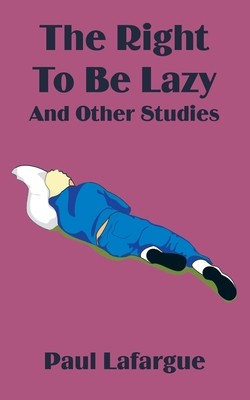
- We will send in 10–14 business days.
- Author: Paul LaFarge
- Publisher: Fredonia Books (NL)
- ISBN-10: 1589639456
- ISBN-13: 9781589639454
- Format: 12.7 x 20.3 x 1.1 cm, minkšti viršeliai
- Language: English
- SAVE -10% with code: EXTRA
Reviews
Description
Essays included in this collection are:
The Right to Be Lazy
Socialism and the Intellectuals
The Bankruptcy of Capitalism
The Woman Question
The Socialist Ideal
The Rights of the Horse and the Rights of Man
Paul Lafargue's masterpiece, The Right To Be Lazy, at once funny and serious, witty and profound, elegant and forceful, is a logical expansion of The Right to the Pursuit of Happiness announced by Thomas Jefferson in the Declaration of Independence. It was not only extremely popular but also brought about pragmatic results, inspiring the movement for the eight-hour day and equal pay for men and women who perform equal work. It survives as one of the very few pieces of writing to come out of the international socialist movement of the nineteenth century that is not only readable-even enjoyable-but pertinent.
Born in Cuba on January 15, 1842, Lafargue was a child of the New World, although he was a citizen of France. Educated and trained as a physician, he found his true calling as a revolutionary, a speaker, writer, agitator, and organizer on behalf of French working people. He took an active part in the Paris Commune and was one of the founders of the party of revolutionary socialists in France. He held public office and represented the French workers at international congresses. He also spent time in French jails.
EXTRA 10 % discount with code: EXTRA
The promotion ends in 22d.13:05:19
The discount code is valid when purchasing from 10 €. Discounts do not stack.
- Author: Paul LaFarge
- Publisher: Fredonia Books (NL)
- ISBN-10: 1589639456
- ISBN-13: 9781589639454
- Format: 12.7 x 20.3 x 1.1 cm, minkšti viršeliai
- Language: English English
Essays included in this collection are:
The Right to Be Lazy
Socialism and the Intellectuals
The Bankruptcy of Capitalism
The Woman Question
The Socialist Ideal
The Rights of the Horse and the Rights of Man
Paul Lafargue's masterpiece, The Right To Be Lazy, at once funny and serious, witty and profound, elegant and forceful, is a logical expansion of The Right to the Pursuit of Happiness announced by Thomas Jefferson in the Declaration of Independence. It was not only extremely popular but also brought about pragmatic results, inspiring the movement for the eight-hour day and equal pay for men and women who perform equal work. It survives as one of the very few pieces of writing to come out of the international socialist movement of the nineteenth century that is not only readable-even enjoyable-but pertinent.
Born in Cuba on January 15, 1842, Lafargue was a child of the New World, although he was a citizen of France. Educated and trained as a physician, he found his true calling as a revolutionary, a speaker, writer, agitator, and organizer on behalf of French working people. He took an active part in the Paris Commune and was one of the founders of the party of revolutionary socialists in France. He held public office and represented the French workers at international congresses. He also spent time in French jails.


Reviews